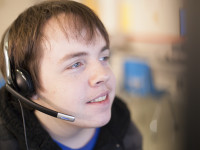The economic recovery is underway, but an important group is being left behind. According to a new report by the International Youth Foundation, the global youth unemployment rate is expected to reach 12.8 percent by 2018.
These trends have occurred while a changing, global economy is producing high-paying jobs that companies are having a tough time filling because candidates lack the required skills. By 2018 there will be 1.5 million computer science-related jobs available in the United States alone. The need is not just in the technology industry, but across all sectors and industries whose success increasingly relies on technological innovation in every department, including marketing, operations, finance and research.
Our education system struggles to keep up with the incredible pace of change and has not fully adjusted to the demands of the global economy. For instance in 2012, of the 42,000 high schools in the U.S., only 2,100 - 5 percent - offered the Advanced Placement computer science course. To help more youth reach their potential, last year we recommended a National Talent Strategy in the United States to broaden access to computer science in high schools and allow computer science classes to count as math or science credits. This year, the Washington State Legislature passed legislation doing just that, bringing to 10 the number of states that recognize computer science in this manner.
We hope to see more states adopt similar policies related to computer science education, but we're not waiting for public policy to catch up with the needs of young people. At Microsoft, we partner with high schools across the U.S. to teach computer science classes through TEALS -- Technology Education And Literacy in Schools -- a Microsoft YouthSpark program. TEALS is placing 280 trained industry software engineers as volunteers into classrooms this school year to "co-teach" with in-service teachers. These volunteers include staff from technology companies all over the U.S., bringing real-world computer science expertise into classrooms.
We're proud of the results these volunteers generate. In 2012, TEALS students averaged a 3.47 score on the national Advanced Placement Computer Science test, which is above the national average of 3.05. In a nation that graduates less than 2.4 percent of college students with degrees in computer science, this is a hopeful sign of progress in inspiring and preparing more students to pursue computer science at the university level. This school year, we're doubling our commitment to TEALS, expanding to 70 schools in 12 states, including nine here in New York, and reaching more than 3,000 students.
In the first year of YouthSpark, which includes programs such as TEALS, Microsoft created new education, employment, and entrepreneurship opportunities for 103 million young people around the world. In partnership with 186 youth-focused nonprofits and through our own programs and products, young people gained the education, skills, and inspiration to pursue new careers in high-demand fields.

We have been inspired by the leadership of youth and their passion to seize opportunities to enhance not only their own lives, but also the world around them. We aim to reach 200 million more youth over the next two years. It's a big goal, but we're encouraged by the words of young people like Jeremy Moore, of Beattyville, Kentucky. Jeremy took a computer science class through TEALS and he is now motivated to pursue a future career in technology. "I thought I wouldn't go to college, and now I am considering it, and it changed my life," Jeremy told us last year.
As Jeremy has taught us, improving access to computer science education not only creates opportunities, it changes lives.